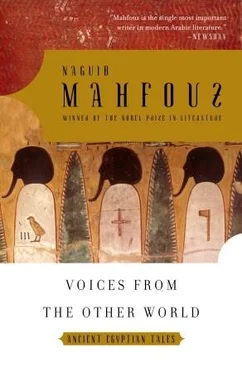The Pasha sighed in dismissal, “The money of the peasants!”
Apologetically, the doctor hastened to add, “Please forgive me, Pasha — this is what they say.”
Pursing his lips, His Excellency shrugged his shoulders disdainfully, as he adjusted his gold-rimmed spectacles over his eyes, saying, “I pay no heed to these vulgar voices of denunciation. And so long as my artistic conscience is ill at ease with leaving these miracles amidst this bestial people, then I will not permit them to be entombed here forever.”
I knew my friend the Pasha’s opinion of the Egyptians and his contempt for them. It is said in this regard that the year before, a gifted Egyptian physician, who had attained the title of “Bey,” came to him, asking for the hand of his daughter. The Pasha threw him out brutally, calling him “the peasant son of a peasant.” Despite my concordance with many of the Pasha’s charges against his countrymen, I could not follow his thinking to its end.
“Your Excellency is a very harsh critic,” I told him.
The Pasha giggled, “You, my dear Dorian, are a man who has given his entire, precious life to the past. Perhaps in its gloom you caught the flash of the genius that inspired the ancients, and it has inflamed your sympathy and affection for their descendants. You must not forget, my friend, that the Egyptians are the people who eat broad beans. ”
Laughing too, I bantered back, “I’m sorry, Your Excellency, but do you not know that Sir Mackenzie, professor of English language at the Faculty of Arts, has recently declared that he has come to prefer broad beans to pudding?”
The Pasha laughed again, and so did we all with him. Then His Excellency said, “You know what I mean, but you like to jest. The Egyptians are genial animals, submissive in nature, of an obedient disposition. They have lived as slaves on the crumbs from their rulers’ banquets for thousands of years. The likes of these have no right to be upset if I donate this museum to Paris.”
“We are not speaking about what is right or not right, but about reality — and the reality is that they would be upset about it,” said Saroux. “And their newspapers will be upset about it along with them,” he added, in a meaningful tone.
Yet the Pasha displayed not the slightest concern. He was by nature scornful of the outcry of the masses, and the deceitful screams of the press. Perhaps due to his Turkish origins, he had the great defect of clinging to his own conceptions, his pertinacity, and his condescension toward Egyptians. He did not want to prolong the discussion, but closed the door upon it with his rare sense of subtlety. He kept us occupied for an hour sipping his delicious French coffee — there was none better in Egypt. Then the Pasha peered at me with interest, “Are you not aware, M. Dorian, that I have begun to compete with you in the discovery of hidden treasures?”
I looked at him quizzically and asked, “What are you saying, Excellence ?”
The Pasha, laughing, pointed outdoors through the salon’s window, “Just a short distance from us, in my palace garden, there is a magnificent excavation in progress.”
Our interest was immediately obvious. I expected to hear a momentous announcement, for the word “excavation” prompts a special stimulus in me. I have spent an enormous part of my life — before I took up my post at the university — digging and sifting through the rich, magical earth of Egypt.
Still smiling, the Pasha continued, “I hope that you will not all make fun of me, my dear sirs, for I have done what the ancient kings used to do with sorcerers and masters of legerdemain. I don’t know how I yielded to it, but there is no cause for regret, for a bit of superstition relieves the mind of the weight of facts and rigorous science. The gist of the story is this. Two days ago, a man well known in this area, named Shaykh Jadallah— whom the people here respect and revere as a saint (and how many such saints do we have in Egypt!) — came to me, to insist on a peculiar request. And I acceded to it, amazing as it was.
“The man hailed me, in his own manner, and informed me that he had located — by means of his spiritual knowledge and through ancient books — a priceless treasure in the heart of my garden. He beseeched me to let him uncover it, under my supervision, tempting me with gold and pearls, if I would but gratify his wish. He was so annoying that I considered tossing him out. But he begged and pleaded with me until he wept, saying: ‘Do not mock the science of God, and do not insult his favored believers!’ I laughed a long time — until I had a sudden thought, and said to myself, ‘Why don’t I humor the man in his fantasy and go along with him in his belief? I wouldn’t lose anything, and I would gain a certain type of amusement.’ And so I did, my friends, and gave the man my permission.
“And now, in all seriousness I show him to you — he who is digging in my garden, with two of my faithful servants assisting in his arduous labor. What do you think?”
The Pasha said all this with considerable mirth: we all laughed again with him. But as for myself, I recalled an incident similar to this one: “Naturally, you don’t believe in the science of Shaykh Jadallah. Nor can I believe in it, either — more’s the pity. But I also cannot forget that I discovered the tomb of the High Priest Kameni because of this same superstition!”
The amazement was plain on the faces of those present, and the Pasha queried me, “Professor, is what you are saying true?”
“Yes, Pasha, one day a shaykh like Shaykh Jadallah came to me in a place near the Valley of the Kings. He said that he had found, by means of his books and knowledge, the whereabouts of a treasure there. We kept pounding away in that spot, and — before the day was out — we found Kameni’s tomb. This was, without a doubt, one of the most brilliant of coincidences.”
Dr. Pierre laughed ironically, “Why do you credit that to coincidence, and deny the ancient science? Isn’t it conceivable that the pharaohs bequeathed to their descendants their hidden secrets, just as they passed on to them their appearance and their customs?”
We kept on distracting ourselves with this sort of chatter, flitting from one topic to another, passing the time in great pleasure. And just before sunset, the guests took their leave. But I announced my wish to observe the excavation that Shaykh Jadallah was conducting in the garden. So we all left the salon, walking through the rear door to bid our good-byes. We had gone but a few steps when we could hear the sounds of a great uproar— and a group of the servants cut across our path. We saw that they were holding a Sa‘idi man, an Upper Egyptian, by his collar, giving him a sound beating with their fists. They dragged him roughly up to the Pasha, and one of them said, “Your Excellency, we caught this thief stealing Beamish’s food.”
I knew Beamish quite well — he was the Pasha’s beloved dog, the most precious creature of God to his heart after his wife and children. He lived a spoiled and honored life in the Pasha’s palace — attended by the staff and servants, and visited by a veterinarian once every month. Each day he was presented with meat, bones, milk, and broth — this wasn’t the first time that the Sa‘idis had pounced on Beamish’s lunch.
The thief was an unmixed Upper Egyptian, marked by the looks of the ancients themselves. It was clear from his dress that he was wretchedly poor. The Pasha fixed him with a vicious stare, interrogating him gruffly, “Whatever induced you to violate the sanctity of my home?”
The man replied in fervent entreaty, panting from his efforts to fight off the servants, “I was starving, Your Excellency, when I saw the cooked meat scattered on the grass. My resistance failed me — I haven’t tasted meat since the Feast of the Sacrifice!”
Читать дальше












